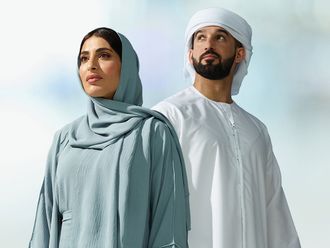Dr Karimat El-Sayed |
When she was in school, she saw other students being wary of science and mathematics. She could not understand why. She loved both, admired the challenge they offered, and respected the way they made her think. She could spend hours studying a law, untangling an equation.
Quite naturally, this Egyptian girl grew up to be a scientist, a professor of solid state physics at the Ain Shams University in Cairo. She studied, she researched, she worked continuously to put the laws of physics to good practical use. And now, Dr. Karimat El-Sayed's 40 years of brilliance and commitment have been acknowledged by the international community. She has received the prestigious Physical Sciences award of the 2003 L'Oreal-Unesco Award for Women in Science, worth $100,000.
Dr Karimat was in Dubai recently to attend a special ceremony held in her honour. "My work is my passion, I work because I cannot do anything else. I do not work for rewards. So I did not expect this award. But I'm very, very happy to have received it because it is an excellent recognition of a scientist in the Arab world," she said in an interview.
She intends to institute two other awards with part of the award money. "One will be for undergraduates at my university. It will be given to the girl student with the highest marks in BSc. The other I want to offer to researchers in the Academy of Science and Technology in Cairo. It will go to the best woman researcher in material sciences," she described. She hoped these awards would encourage the study of physics in Egypt.
Dr Karimat agreed that the study of physics was declining, particularly in developing countries. "In the Arab world, men and women do not want to go into physics because its study and research is not used to improve society. In all developing countries, research is imported," she said.
"These countries may have very good scientists who have the talent and potential to improve the condition of living. But they are not given the right opportunities. At the same time, when our scientists go abroad, they do very, very well."
But Dr Karimat has no regrets, content to do her own research and communicate her love of the science to her students. "Physics is the science of nature, all its laws come from nature, it is based on what you see and observe," she underlined.
"If you want to know what God is doing, you have to study physics."
Physics helps us to imitate nature in the best possible way, she said. "Imitating the revolution of the planets gives you satellites; imitating light waves allows you to set up telecommunications."
Dr Karimat said she has always been interested in science. "When I was in school I loved physics and mathematics. In these subjects you have to exercise your brain, studying them is like playing chess. If solving very difficult problems makes you happy then these subjects will give you complete satisfaction," she pointed out.
Is a woman choosing physics somewhat unusual? Yes, Dr Karimat answered immediately.
"Women usually study life sciences because they have a talent for observing very minute things. Physics, on the other hand, depends on calculations and making accurate predictions based on these calculations. Life sciences are easier, they do not take as much time."
At the same time, she did not believe in stereotyping the genders. "God created man and woman to complement each other, both have own skills and talents. A woman has more patience, she can see the future better. Marie Curie worked with her husband and discovered better things than him. If they work together, men and women can do marvellous things," she stressed.
Inspired greatly by the same Marie Curie (the first scientist to win two Nobel Prizes), Dr Karimat went on to study physics in college. After graduating from Ain Shams University with honour, she took her Ph.D. under Kathleen Lonsdale of University College, London University.
In her thesis, which could be considered innovative at the time, Dr Karimat correlated the thermal vibration of each individual atom in the structure with the thermal expansion of the studied material.
Returning home, she was appointed to the physics department (science faculty) of Ain Shams University at a time when the discovery of the transistor began to show that small amounts of impurities (doping) could profoundly change the properties of many materials.
Dr Karimat undertook and published most of her work concerned with structures (finding the distribution of atoms and impurities in atoms inside materials), microstructural properties and application of low concentrations of constituents in materials relevant to industrial metallurgy, and semi-conducting materials.
For example, she has diagnosed that aluminium foils were weakened by cracks resulting from the presence of a particular form of silica (sand) impurity and that oxygen atoms were poisoning certain semiconductors exposed to the air.
Thanks to the expertise she acquired regarding crystal growth, Dr Karimat has analysed the formation of urinary stones. These grow epitaxially layer upon layer, alternately calcium oxalate and organic material consisting of proteins. "They grow around organic material that comes from bacterial infection," she explained.
"I have also done a project with a pharmacist. I have studied the structure of drugs extracted from medicinal plants. This will help researchers synthesise the most potent and effective versions of these drugs," she pointed out, proving that different branches of science are no longer rigidly separated.
While Dr Karimat continues to explore and expand the possibilities of physics, she remains at the centre of her large family: husband, two sons, one daughter, and four grandchildren.
"I learnt to balance home and career from my Ph.D. supervisor. She also had children and grandchildren," she said.
"She told me when she worked, she actually looked after her children better because when she went home, they had all her attention. But when she was at home, they were around her all the time so she did not give them particular time. I feel the same way."
Luckily for her students and the larger scientific community.
The award
The L'Oreal-Unesco Awards, created in 1998, had been dedicated to life sciences. This year, for the first time, they recognised women in the material sciences. Five "Laureates" in the material sciences and 15 "Fellows" in life sciences were honoured recently at Unesco's headquarters in Paris. This year's awards brought to 71 the number of women (from 45 countries) who have been honoured by the programme.
The L'Oreal-Unesco for Women in Science programme aims to improve the position of women in science by recognising outstanding women researchers from five regions (Africa, Asia-Pacific, Europe, Latin America and North America) who have contributed to scientific progress (L'Oreal-Unesco Awards of $100,000 each) and young women scientists engaged in exemplary and promising pr












